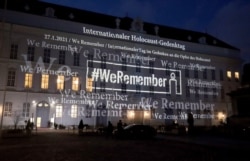A somber United Nations ceremony in tribute to those who perished in Nazi death camps was dominated by the fear that the lessons of the Holocaust were being lost and forgotten.
Israeli pianist, Amit Weiner and violinist Amit Ifrach set the tone of this solemn ceremony with selected pieces from composer, Mordechai Gebirtig’s Music in Times of Tragedy—the Music from the Holocaust.
The mood fit the desolation of the U.N. auditorium, largely empty because crowds are discouraged in this time of coronavirus. In his remarks on this occasion, U.N. Secretary-General, Antonio Guterres noted this year’s anniversary ceremony was taking place under the shadow of COVID-19. He said the pandemic revealed long standing injustices and contributed to the resurgence of antisemitism and xenophobia.
“Today, white supremacists and neo-Nazis are resurgent, organizing and recruiting across borders intensifying their efforts to deny, distort and rewrite history, including the Holocaust,” he said.
Israeli Ambassador to the U.N. in Geneva, Meirav Eilon Shahar honored the six million Jews who were exterminated in the Holocaust. On this day 76 years ago, she noted Auschwitz Birkenau camp, the symbol of Hitler’s Final Solution was liberated. She said at the end of World War II, the world pledged “Never Again.”
“But here we are today—76 years after the Shoah, we should all be alarmed by the rise of antisemitism and racism…and when Holocaust denial is on the rise,” she said.
Ninety-year-old Holocaust survivor, Fanny Ben-Ami, recounted in gripping detail how she, as a 13-year-old girl along with 22 other children escaped to Switzerland by ruse, good luck and great courage. She survived, but her mother, father and uncle were killed in the Nazi concentration camps. Her words are spoken by an interpreter.
“I am not a survivor of the Shoah, of the Holocaust. I ran away. I was not in the camps. I was not beaten. I did not suffer, and I did not get thin. I did not wear one of those striped suits. And, so finally despite everything, those of us who came back from the war… they call us the people of the Shoah, the people of the Holocaust,” she said.
German Ambassador to the U.N. in Geneva, Michael Freiherr von Ungern-Sternberg paid homage to Fanny Ben-Ami. He said her testimony sent shivers down his spine in light of rising antisemitism, hatred and racism around the world. While we cannot undue the horrors of the past, he said humanity holds a shared responsibility to prevent genocide in the future.





